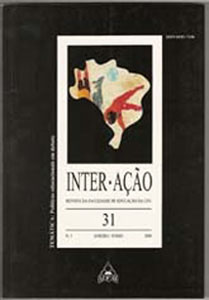TENDENCIAS MUNDIALES EN LA EDUCACIÓN SUPERIOR: EL PAPEL DE LOS ORGANISMOS MULTILATERALES
DOI:
https://doi.org/10.5216/ia.v31i1.1490Resumo
El objetivo de este trabajo es mostrar a través del análisis global de varios documentos recientes de los organismos multilaterales, las tendencias actuales de la educación superior en el mundo y sus implicaciones para el caso de México. Los documentos que han sido seleccionados en esta ocasión tienen diversos alcances: mundial (Organización de las Naciones Unidas para la Educación, la Ciencia y la Cultura, UNESCO y Banco Mundial, BM), regional (Banco Interamericano de Desarrollo, BID) y nacional (Organización de Cooperación y Desarrollo Económicos, OCDE). En ellos se examina la situación que guarda la educación superior en el mundo actual, así como los retos que enfrenta ante las nuevas realidades de la sociedad del conocimiento.Downloads
Downloads
Publicado
Como Citar
Edição
Seção
Licença
A Inter-Ação utiliza como base para transferência de direitos a licença Creative Commons Attribution 4.0 para periódicos de acesso aberto (Open Archives Iniciative - OAI). Por acesso aberto entende-se a disponibilização gratuita na Internet, para que os usuários possam ler, baixar, copiar, distribuir, imprimir, pesquisar ou referenciar o texto integral dos documentos, processá-los para indexação, utilizá-los como dados de entrada de programas para softwares, ou usá-los para qualquer outro propósito legal, sem barreira financeira, legal ou técnica.
Autores que publicam neste periódico concordam com os seguintes termos:
1) Autores mantém os direitos autorais e concedem à revista o direito de primeira publicação, com o trabalho simultaneamente licenciado sob a Licença Creative Commons Attribution que permite o compartilhamento do trabalho com reconhecimento da autoria e publicação inicial nesta revista.
2) Autores têm autorização para assumir contratos adicionais separadamente, para distribuição não-exclusiva da versão do trabalho publicada nesta revista (ex.: publicar em repositório institucional ou como capítulo de livro), com reconhecimento de autoria e publicação inicial nesta revista.
3) Autores têm permissão e são estimulados a publicar e distribuir seu trabalho online (ex.: em repositórios institucionais ou na sua página pessoal) a qualquer ponto antes ou durante o processo editorial, já que isso pode gerar alterações produtivas, bem como aumentar o impacto e a citação do trabalho publicado.















